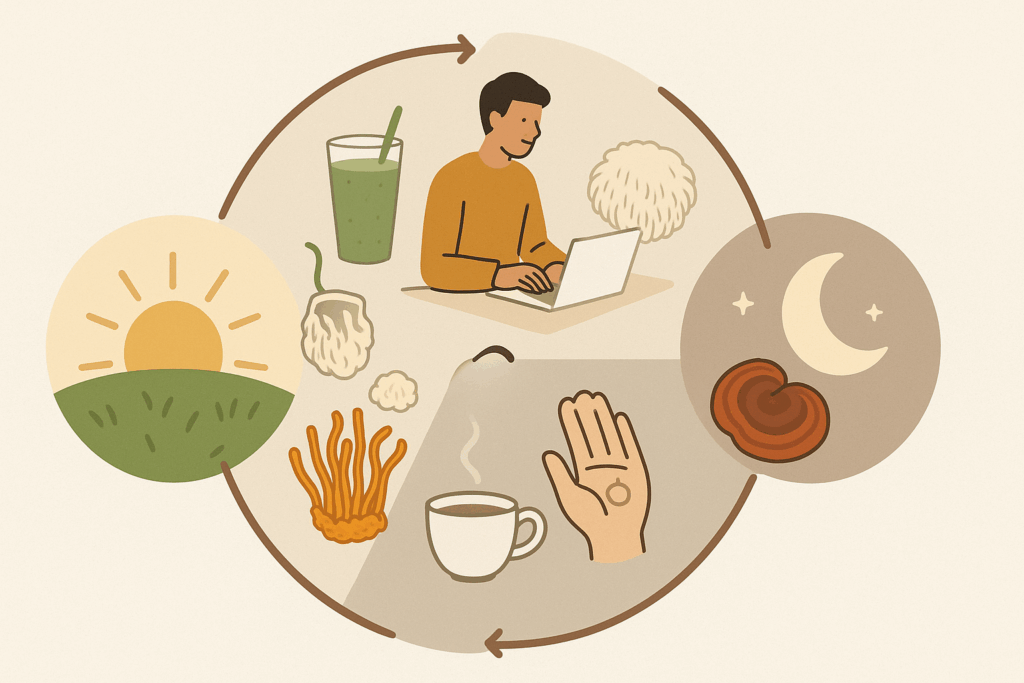Maintaining a steady stream of energy throughout the day is a common challenge in our fast-paced world. From early-morning commutes to late-night work sessions, our bodies and minds are constantly asked to perform at peak levels. For those wondering how to stay energized all day, the answer often lies beyond caffeine and sugary snacks. Instead, it begins with understanding the root causes of energy fluctuations and addressing them through sustainable, scientifically grounded strategies. Adaptogens, a class of herbal and mushroom-based compounds that help the body resist stressors of all kinds, have emerged as powerful allies in this quest for balanced vitality.
You may also like: Unlock Powerful Stress-Relief with Adaptogenic Mushrooms and Stamina Herbal Support
Understanding the Role of Energy Regulation in Daily Life
Energy, in the biological sense, is the capacity of our cells to perform essential functions, from brain activity and immune defense to physical movement and hormonal regulation. However, energy levels are not fixed. They ebb and flow based on circadian rhythms, nutrient availability, stress exposure, sleep quality, and underlying health conditions. For many, afternoon slumps or morning grogginess are signs that the body is struggling to maintain equilibrium. While conventional fixes like caffeine may offer short-term relief, they often lead to crashes, jitteriness, or disrupted sleep cycles. In contrast, adaptogens work to harmonize internal systems and offer a more grounded approach to sustainable energy.
Adaptogens are unique because they support the hypothalamic-pituitary-adrenal (HPA) axis, the body’s central stress-response network. When this system is balanced, cortisol levels remain stable, mental clarity improves, and energy remains consistent. Unlike stimulants, which spike adrenaline or dopamine, adaptogens act like thermostats, nudging the body gently toward homeostasis. By enhancing resilience to stress, they help preserve the body’s natural energy reserves, allowing for improved focus and reduced fatigue.

How to Stay Energized All Day with Adaptogenic Mushrooms
Adaptogenic mushrooms are among the most potent tools for boosting endurance, sharpening focus, and preventing burnout. They contain bioactive compounds like beta-glucans, triterpenes, and polysaccharides that interact with immune, nervous, and endocrine systems. Reishi, Cordyceps, Lion’s Mane, and Chaga are four of the most well-researched mushrooms that support sustained vitality.
Reishi, often called the “mushroom of immortality,” modulates the immune system and calms the nervous system. Though not directly stimulating, its calming effect can reduce anxiety-induced fatigue and improve sleep quality, both of which are critical for maintaining energy the next day. Cordyceps, on the other hand, directly enhances cellular energy production by increasing ATP (adenosine triphosphate), the energy currency of the cell. It has been shown to improve oxygen utilization and stamina, making it popular among athletes.
Lion’s Mane is particularly beneficial for cognitive endurance. Its compounds hericenones and erinacines promote the growth of nerve cells and support brain-derived neurotrophic factor (BDNF). This leads to improved memory, focus, and mental clarity, which are essential components of feeling energized. Chaga, rich in antioxidants, combats oxidative stress and inflammation, two silent saboteurs of energy. By reducing systemic inflammation, Chaga helps preserve mitochondrial function and enhances metabolic efficiency, two foundational factors in all-day energy maintenance.

The Science of How to Stay Energized Throughout the Day Without Stimulants
Many people associate energy with stimulation, but true vitality is rooted in balance and sustainability. Stimulants may mask underlying energy deficits, but adaptogens correct imbalances at the source. For example, when chronic stress elevates cortisol, it impairs sleep, increases fat storage, and triggers inflammation—all of which deplete energy over time. Adaptogens like Rhodiola rosea have been shown to regulate cortisol secretion and enhance stress resilience. In clinical trials, Rhodiola has improved fatigue symptoms in both healthy individuals and those experiencing chronic stress.
Ashwagandha is another adaptogen with profound effects on energy regulation. A staple in Ayurvedic medicine, it supports adrenal function, thyroid hormone balance, and blood sugar regulation. These systems are intimately connected to how we feel throughout the day. When blood sugar is unstable, we experience energy spikes followed by crashes. By promoting metabolic homeostasis, Ashwagandha helps the body maintain consistent energy.
In addition, Panax ginseng has a long history of use in traditional Chinese medicine for enhancing stamina and reducing mental fatigue. Studies suggest it supports mitochondrial function, improves glucose metabolism, and enhances physical performance. These effects make it ideal for individuals with demanding schedules who need to sustain focus and physical energy simultaneously.

Integrating Adaptogens into a Daily Routine for Consistent Energy
Creating a sustainable routine is key to experiencing the full benefits of adaptogens. These compounds are most effective when taken consistently over several weeks, as they work gradually to recalibrate bodily systems. One of the most practical ways to incorporate them is through functional beverages such as mushroom-infused teas, adaptogenic coffee alternatives, or powdered blends that can be added to smoothies or oatmeal.
Morning routines can benefit from energizing adaptogens like Cordyceps or Rhodiola, which provide mental clarity and physical endurance without overstimulation. Midday is ideal for Lion’s Mane, especially during cognitively demanding tasks. Evening rituals might include calming adaptogens like Reishi or Ashwagandha to promote recovery and restful sleep. Over time, this rhythm supports circadian alignment and reduces the need for artificial stimulants.
It is important to note that not all adaptogens work the same way for everyone. Bioindividuality plays a major role, and some experimentation may be required. Consulting with a qualified healthcare provider can help tailor an adaptogen protocol based on individual needs, sensitivities, and health goals. Additionally, pairing adaptogens with nutrient-dense meals, physical activity, and mindfulness practices can amplify their benefits.

Nutritional Foundations for How to Stay Energized All Day
While adaptogens provide systemic support, nutrition forms the bedrock of sustainable energy. Poor dietary choices can sabotage even the best adaptogen regimen. Consuming high-glycemic foods leads to rapid blood sugar spikes and crashes, creating cycles of fatigue and irritability. Conversely, meals rich in fiber, protein, healthy fats, and complex carbohydrates provide a steady release of glucose, the brain’s primary fuel.
Key nutrients that influence energy metabolism include B vitamins, magnesium, iron, and omega-3 fatty acids. B vitamins, particularly B12 and B6, are essential for mitochondrial function and neurotransmitter synthesis. Magnesium plays a central role in ATP production and muscle relaxation. Iron, especially in its heme form, supports oxygen transport and energy production. Omega-3s reduce inflammation and enhance brain function, contributing to mental stamina.
Including whole foods such as leafy greens, legumes, eggs, nuts, seeds, and fatty fish can ensure these nutrients are adequately supplied. Functional foods like fermented vegetables and bone broth also support gut health, which is increasingly recognized as a cornerstone of energy regulation. The gut-brain axis directly influences mood, immunity, and metabolic processes, underscoring the importance of a well-balanced microbiome.

Stress and Fatigue: Understanding Their Interplay in Daily Energy Levels
Chronic stress is a major contributor to low energy, as it places constant demands on the HPA axis and depletes key neurotransmitters like dopamine and serotonin. When stress becomes persistent, it leads to a condition known as adrenal dysregulation, characterized by erratic cortisol levels, sleep disturbances, and immune suppression. This state not only drains physical energy but also blunts emotional and cognitive resilience.
Adaptogens play a pivotal role in mediating the effects of stress. By modulating stress hormone responses and enhancing parasympathetic nervous system activity, they create an internal environment that fosters restoration. In essence, adaptogens don’t eliminate stressors; they strengthen the body’s ability to cope with them. Over time, this translates into reduced fatigue, improved mood, and greater endurance.
Complementary practices such as deep breathing, meditation, yoga, and nature exposure further reinforce the stress-buffering effects of adaptogens. These practices activate the vagus nerve and reduce sympathetic nervous system overdrive, allowing energy to be directed toward healing and maintenance instead of defense and alarm. Combining these tools can restore a sense of vitality that feels grounded rather than frenetic.
Building a Lifestyle Framework Around How to Stay Energized Throughout the Day
Sustained energy is not the result of a single intervention but rather the synergy of multiple habits working together. In addition to adaptogens and nutrition, hydration plays a critical role. Even mild dehydration can impair concentration, elevate stress hormones, and trigger headaches or fatigue. Drinking water throughout the day, especially when paired with electrolyte-rich foods like cucumbers, citrus, or coconut water, supports cellular function and energy distribution.
Physical movement is another pillar. While excessive exercise can be draining, moderate, regular activity boosts endorphin levels, enhances circulation, and improves mitochondrial efficiency. Walking, swimming, and strength training are all effective ways to generate energy without overtaxing the body. Timing also matters: morning movement can set a positive tone for the day, while evening stretches aid recovery and sleep quality.
Sleep, often overlooked, is foundational. It is during deep sleep that the body performs most of its repair functions, including hormone synthesis, memory consolidation, and cellular regeneration. Poor sleep quality undermines all other efforts to maintain energy. Using adaptogens like Reishi or Ashwagandha in the evening, creating a dark and cool sleeping environment, and reducing screen time before bed can collectively improve sleep architecture and support daily vitality.
Adaptogen Safety and Contraindications: What You Need to Know
Though adaptogens are generally safe for long-term use, they are not universally appropriate for everyone. Individuals with autoimmune disorders, hormone-sensitive conditions, or those taking medications for blood pressure, thyroid, or mood regulation should consult with a healthcare provider before beginning adaptogen supplementation. For example, while Ashwagandha supports thyroid function, it may not be suitable for those with hyperthyroidism.
Similarly, Cordyceps may interact with blood sugar or anticoagulant medications, and Panax ginseng can affect hormone levels. Pregnant or breastfeeding individuals should exercise caution, as adaptogen safety profiles in these populations are not well-established. Starting with low doses and monitoring the body’s response is a prudent approach.
Quality sourcing also matters. Because dietary supplements are not tightly regulated, choosing reputable brands that offer third-party testing and transparent labeling is essential. Look for products that are organic, non-GMO, and free from additives. The presence of standardized extracts ensures consistent potency and efficacy.

How to Stay Energized All Day with Mindful Living Practices
Adaptogens are most effective when paired with a lifestyle that values rest, reflection, and intentionality. Mindful living is about cultivating awareness of how daily habits influence physiological and emotional states. This includes tracking energy patterns, recognizing triggers for fatigue, and adjusting routines accordingly.
For example, keeping a journal to note how different foods, sleep patterns, or stressors affect your energy can provide valuable insight. This empowers individuals to create personalized rituals that support consistent performance. Incorporating breathwork, stretching, creative expression, or short breaks between work sessions can reduce mental fatigue and promote nervous system balance.
Digital detoxes are also powerful tools for reclaiming energy. Constant exposure to screens, notifications, and information overload places a subtle but continuous drain on mental resources. Scheduling tech-free blocks of time allows the mind to reset and enhances the restorative effects of other energy-supportive practices. Over time, these small shifts lead to significant gains in resilience, clarity, and overall vitality.
Frequently Asked Questions: Essential Adaptogenic Insights for Lasting Daily Energy
What makes adaptogens different from conventional energy supplements?
Adaptogens differ from standard energy supplements primarily in their mechanism of action. Rather than providing a quick spike in energy like caffeine or sugar, adaptogens modulate the body’s stress response over time. They support hormonal balance, particularly within the HPA axis, and promote steady energy by enhancing resilience. Many conventional energy boosters target dopamine or adrenaline pathways, which can lead to crashes or tolerance over time. Adaptogens, by contrast, help recalibrate internal systems, making them ideal for those exploring sustainable strategies for how to stay energized all day.
Can adaptogens improve both physical and mental energy simultaneously?
Yes, many adaptogens support dual benefits for both physical stamina and cognitive performance. For example, Cordyceps sinensis has been shown to enhance oxygen uptake and mitochondrial function, improving endurance and muscular efficiency. At the same time, Lion’s Mane mushroom stimulates the production of nerve growth factor (NGF), which supports memory and mental clarity. This dual action can be particularly useful for professionals, students, or athletes who need sharp mental focus paired with physical vigor. When used consistently, these adaptogens offer a non-jittery way to stay energized throughout the day without relying on synthetic stimulants.
How can I use adaptogens to align my energy with natural circadian rhythms?
To support energy alignment with circadian rhythms, timing your adaptogen intake is key. Adaptogens like Rhodiola and Cordyceps are best taken in the morning to support alertness and stamina, aligning with your body’s natural cortisol peak. Reishi and Ashwagandha, on the other hand, are ideal for evening use, as they promote relaxation and parasympathetic nervous system activity. This strategic timing supports the ebb and flow of your body’s hormonal patterns, encouraging restorative sleep and balanced morning wakefulness. By using adaptogens in this way, you can help retrain your internal clock while exploring how to stay energized all day through natural biological alignment.
What role does emotional resilience play in maintaining energy levels?
Emotional resilience is a crucial, often overlooked factor in maintaining consistent energy throughout the day. Chronic emotional stress, unresolved conflicts, or anxiety can sap energy just as effectively as physical exertion. Adaptogens help by balancing stress hormones like cortisol and enhancing neurotransmitter function, which in turn supports a more balanced mood. By reducing the frequency and severity of emotional stress responses, adaptogens help preserve energy that might otherwise be lost to emotional reactivity or overwhelm. Cultivating emotional regulation through mindfulness, journaling, or therapy can further complement the biochemical support of adaptogens and contribute to how to stay energized throughout the day in a grounded and emotionally stable way.
Can adaptogens help those with irregular schedules, such as shift workers or frequent travelers?
Absolutely. Adaptogens are particularly beneficial for individuals with disrupted sleep-wake cycles or variable routines. Shift workers and frequent travelers often suffer from circadian misalignment, jet lag, and sleep disturbances, which impair energy and cognitive function. Adaptogens like Schisandra chinensis and Eleuthero (Siberian ginseng) have been shown to enhance mental alertness while mitigating the fatigue associated with changing time zones or late-night work. When combined with sleep hygiene practices and light exposure therapy, adaptogens can help the body re-establish balance. This makes them a powerful option for professionals seeking personalized solutions for how to stay energized all day despite unconventional schedules.
How do adaptogens support metabolic efficiency and energy conservation?
Adaptogens enhance metabolic efficiency by optimizing mitochondrial function and reducing oxidative stress. Mitochondria are the cellular engines responsible for energy production, and their performance is often hindered by inflammation, poor diet, or chronic stress. Compounds found in adaptogens, such as triterpenes in Reishi or ginsenosides in Panax ginseng, help protect mitochondria from damage while improving ATP synthesis. This means the body can extract more energy from nutrients without excessive strain or resource depletion. In the long term, better metabolic efficiency translates to improved endurance and more predictable energy patterns, especially when exploring how to stay energized throughout the day without relying on stimulants.
What are some advanced ways to combine adaptogens with lifestyle interventions for optimal energy?
Advanced strategies for energy optimization involve combining adaptogens with targeted biohacks and wellness practices. For example, pairing morning Rhodiola intake with 10–15 minutes of bright light exposure can enhance wakefulness and mood. Midday Lion’s Mane use, alongside a nootropic stack containing citicoline or phosphatidylserine, can boost learning capacity and memory consolidation. Evening use of Reishi with magnesium glycinate or L-theanine enhances recovery and promotes deep sleep. Integrating breathwork, intermittent fasting, or contrast hydrotherapy can further support metabolic resilience. These sophisticated routines are highly effective for high performers and wellness enthusiasts seeking cutting-edge solutions for how to stay energized all day through holistic, evidence-informed frameworks.
Are there any psychological or behavioral shifts that can amplify adaptogenic benefits?
Yes, adopting certain behavioral and cognitive shifts can significantly enhance the effects of adaptogens. Cultivating a growth mindset—believing that energy, focus, and resilience can be developed—supports neuroplastic changes that align with adaptogenic pathways. Practices like visualization, gratitude journaling, or intention-setting create positive neurochemical feedback loops, reinforcing the adaptogen’s stress-buffering benefits. Additionally, breaking the “busyness equals productivity” mindset can help reduce burnout, allowing adaptogens to function more effectively within a less stressed nervous system. When individuals embrace self-regulation and intentional living, they create an internal landscape that not only sustains adaptogenic impact but also aligns with the broader goal of how to stay energized throughout the day without depletion.
What emerging research is being conducted on adaptogens and energy metabolism?
Current research is delving into how adaptogens interact with molecular pathways like AMPK (adenosine monophosphate-activated protein kinase) and mTOR (mechanistic target of rapamycin), both of which regulate cellular energy status. Studies suggest that adaptogens may modulate these pathways to encourage energy conservation during stress while still maintaining performance. There’s also growing interest in adaptogen-driven modulation of the gut microbiome, which plays a significant role in mood, immunity, and energy balance. Some clinical trials are examining personalized adaptogen blends using metabolomics to tailor regimens based on individual biomarkers. These innovations represent the future of functional medicine and offer new ways of thinking about how to stay energized all day with precision, personalization, and predictive health technologies.
How long does it typically take to experience noticeable energy benefits from adaptogens?
The onset of benefits varies by individual, but many people begin to notice subtle improvements within two to three weeks of consistent use. Energy may feel more stable, stress responses less intense, and sleep more restorative. However, deeper systemic changes—like hormonal balance or mitochondrial regeneration—often require 6 to 12 weeks. It’s essential to approach adaptogen use with patience and consistency, as their effects are cumulative rather than immediate. Tracking your experience through a wellness journal or app can help identify trends and reinforce motivation. When approached as part of a long-term wellness plan, adaptogens become powerful allies in the ongoing journey of discovering how to stay energized throughout the day through natural, sustainable methods.
Conclusion: Embracing Adaptogenic Wisdom to Sustain Daily Energy Naturally
Achieving consistent, crash-free energy is not a matter of quick fixes but of cultivating a deeper understanding of how the body functions and what it truly needs. By integrating adaptogens, whole-food nutrition, stress resilience strategies, and mindful living practices, we create an internal ecosystem that supports vitality from the inside out. Knowing how to stay energized all day is less about chasing stimulation and more about nurturing the body’s inherent capacity for balance and endurance.
Adaptogenic mushrooms like Reishi, Cordyceps, Lion’s Mane, and Chaga offer potent, evidence-based support for mental, physical, and emotional energy. Coupled with adaptogenic herbs such as Rhodiola, Ashwagandha, and Panax ginseng, they form a robust toolkit for navigating daily demands with grace and strength. When used mindfully and consistently, these natural allies can replace the highs and lows of conventional energy boosters with a steady, grounded sense of vitality.
Ultimately, the journey to lasting energy is about alignment—with nature, with circadian rhythms, and with the wisdom of our own bodies. It is about choosing practices that sustain us rather than deplete us. And in that process, we discover that the most powerful solutions are often the ones that honor both science and tradition, providing not just energy for today but resilience for a lifetime.
Further Reading:
10 ways to boost your energy and feel rejuvenated throughout the day
